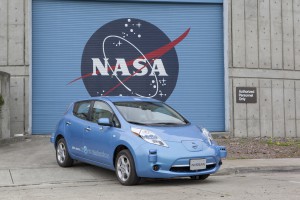
The all-electric Nissan Leaf fitted with autonomous drive equipment allowed to park at NASA’s Ames Research Center.
The names of vehicles used by NASA in its research efforts roll off the tongue: Columbia, Discovery, Endeavour…Leaf? Maybe not, but the space agency and Nissan Motor Co. are partnering up to develop autonomous vehicle systems that could have applications on the ground and in space.
“The work of NASA and Nissan – with one directed to space and the other directed to earth, is connected by similar challenges,” said Carlos Ghosn, president and CEO of Nissan Motor Co. “The partnership will accelerate Nissan’s development of safe, secure and reliable autonomous drive technology that we will progressively introduce to consumers beginning in 2016 up to 2020.”
The five-year partnership will team researchers from Nissan’s U.S. Silicon Valley Research Center and NASA’s Ames Research Center in California who will test a fleet of zero-emission vehicles used to transport a variety of materials, goods, payloads and people. The tests are similar to the way NASA currently operates its planetary rovers remotely from a mission control center.
As part of the program, the teams will develop autonomous drive systems, human-machine interface solutions, network-enabled applications and software analysis and verification for road and space applications.
The first vehicle will be in the test fleet by the end of this year, Nissan said. The plan calls for NASA to benefit from Nissan’s expertise in autonomous technologies as well as the development of different transportation applications and robotic software.
“All of our potential topics of research collaboration with Nissan are areas in which Ames has strongly contributed to major NASA programs,” said director of Ames Research Center, S. Pete Worden.
(Nissan’s Taxi of Tomorrow gets go for Big Apple debut. For more, Click Here.)
“Ames developed Mars rover planning software, robots onboard the International Space Station and Next Generation air traffic management systems to name a few. We look forward to applying knowledge developed during this partnership toward future space and aeronautics endeavors.”
(Click Here for details about the most important debuts at the Detroit Auto Show.)
The project gives Nissan, which has publicly committed to having an autonomous vehicle on the road by 2020, one more avenue to speed product development. That may be critical given the number of competitors in the self-driving vehicle segment now, including Google, which has several prototypes its testing with focus groups, and Cadillac with its SuperDrive coming on its new flagship sedan, the CT6, and Mercedes-Benz, among others.
(To see why Americans may be ready for autonomous vehicles, Click Here.)
A study released by Boston Consulting Group today suggests that there is a strong demand for viable autonomous vehicles with consumers willing to pay as much as $5,000 more for vehicles with the technology.
The study forecasts the first semi-autonomous vehicles will reach market by 2016, with fully autonomous models due by 2025, by which point BCG predicts the market for the technology will be worth $42 billion annually.
